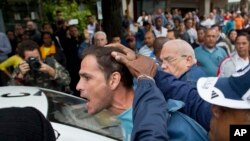Leading human rights groups have stressed to U.S. lawmakers that historic diplomatic breakthroughs with Cuba should not shield it from rigorous American scrutiny of human rights violations.
“In Iran and Cuba, the United States needs to leverage its diplomacy to look at human rights issues and not separate its diplomacy to either look, in the case of Iran, solely at the importance of nuclear peace - or in the case of Cuba, treating diplomacy as an end in itself,” said Mark Lagon, president of Washington-based Freedom House, testifying before the Senate Foreign Relations Committee on July 16.
“The U.S. decision to plow forward, full speed ahead, with the restoration of diplomatic relations with Cuba just as 100 peaceful activists were being detained sends troubling and mixed messages,” Lagon added.
Competing interests
Democratic Cuban-American Senator Robert Menendez seized on the discussion in relation to Cuba, and chastised his congressional colleagues for their itineraries when they visit the communist island-nation.
“It’s pretty amazing to me that, when our colleagues in the Senate go to visit Cuba, they do not visit with human rights activists, political dissidents, independent journalists, because if they do, they get barred from a [Cuban] government meeting,” said Menendez.
The Obama administration maintains that restoring diplomatic relations with Havana will further the cause of civil liberties and human rights by boosting communications and exchanges between the two countries that had been estranged for more than 50 years.
When the thaw in relations was announced late last year, Cuba announced several rights-related trust-building measures, including agreeing to release 53 political dissidents, expand Internet access, and allow more visits by rights monitors.
But the communist government continues to hold dozens more political prisoners, tightly restricts freedom of expression, and uses threats and intimidation to discourage government critics, according to activist groups.
Political prisoners
At least 60 political prisoners remain behind bars in Cuba, including at least two dozen held on charges linked to peaceful political protests, according to a report this month by the independent Cuban Commission of Human Rights and National Reconciliation (CCDHRN).
Those figures are much lower than in past decades, when Cuba was holding thousands of political prisoners. But activists warned that in some ways the progress was deceptive and reflects only a change in tactics.
For instance, there has been a sharp increase in the number of short-term, arbitrary detentions, according to the CCDHRN. The group received over 7,100 reports of arbitrary detentions in the first part of last year, over twice as many as during the same period in 2013.
"Detention is often used preemptively to prevent individuals from participating in peaceful marches or meetings to discuss politics," according to Human Rights Watch's 2015 report on Cuba.
The New York-based group's report also slammed Cuba for "severely limiting" the right to freedom of expression. "Only a very small fraction of Cubans are able to read independent websites and blogs because of the high cost of, and limited access to, the Internet," the report said.
"Those who publish information considered critical of the government are sometimes subject to smear campaigns, attacks, and arbitrary arrests, as are artists and academics who demand greater freedoms," it continued.
US engagement and reforms
President Barack Obama has argued that increased engagement with Cuba will help give the U.S. more, not less, sway in encouraging the human rights and political reforms.
Some rights groups agree with that assessment.
"President Barack Obama’s historic decision to overhaul U.S. policy toward Cuba is a crucial step toward removing a major obstacle to progress on human rights on the island," said a December HRW statement.
"Rather than isolating Cuba, the embargo has isolated the United States, alienating governments that might otherwise speak out about the human rights situation on the island" said Jose Miguel Vivanco, Americas director at Human Rights Watch.
The London-based Amnesty International also expressed hope that the move will offer an opportunity to "forge an agenda for human rights."
"If the U.S. embargo on Cuba, and its negative impact on the economic and social rights of Cubans, is lifted as part of efforts to normalize relations between the two countries, it will mean Cuban authorities can no longer use the crippling sanctions as an excuse for lagging behind on its international human rights obligations."
In its latest report on the state of global human rights, the U.S. State Department itself kept up the pressure on Cuba, acknowledging that widespread abuses remain a serious problem.








